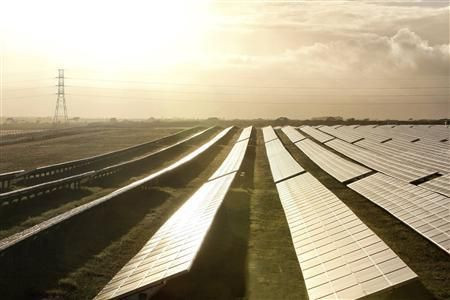UK Government Wants All New Homes To Meet Zero Carbon Standards By 2050

All new homes in the United Kingdom are urged to take part in the government’s emissions reduction policy plan, Sky News reported. In the UK, the preferred form of renewable energy is wind power, but solar power is gaining popularity.
According to the Deep Decarbonization report, 80 percent of the building sector’s carbon emissions emanates from residential homes and comes mostly from use of gas for heating. As part of the UK’s policy plan, it is targeting a reduction of 50 percent of these emissions by 2050.
This, the report said, can be achieved through technologies that the government are willing to support for residential homeowners transition to renewable energies. Cutting dangerous emissions in residential homes is only part of a bigger “ambitious policy package” goal of UK.
“Without a sustained and strong policy push that increases year on year in ambition, the delivery of low carbon technologies at the necessary scale will not be achieved,” lead author Steve Pye of the University College of London (UCL) Energy Institute, was quoted as saying in Clean Technica.
UCL scientists conducted the research contained in the Deep Decarbonization report. The report also noted that carbon emissions need a reduction within 15 years and further trimming of carbon dioxide production by 2050.
“For this, the UK needs policies now that realise the full low cost energy efficiency potential in buildings, ensure the rapid deployment of low carbon generation technologies such as CCS, and prepare for the roll-out of low emissions vehicles in the transport sector and alternative, non-gas based heating systems for homes,” the report stated.
UK’s targets is an effort ahead of the Paris conference later this year, 2015, where developing and developed nations are expected to “reach a deal with legal force, including through binding rules, to combat climate change.”
Scientists and environmentalists have urged world leaders to put forth actions to implement climate solutions and reduce the amount of emissions or face a grim climate future, which will affect many nations and food security. Climate change is one of the environmental threats facing the world and a key solution to it is a shift renewable energies.
Among renewable energy technologies, solar power has attracted the most investments. In the UK, the increase of renewable energy sector in the past years has been attributed to the improving solar panel ventures.
Business Insider cited reports that “Solar photovoltaic (PV) capacity was the largest contributor to the increase on a year earlier, increasing by 1.9 gigawatts.” Sun-powered energy sources are touted to be the most efficient and cost-effective.
According to Bloomberg New Energy Finance, solar power alone is expected to draw $3.7 trillion in investments. The solar power expansion will be in the form of massive power plants, about 1.5 terawatts by 2040, and an additional 800 gigawatts of small-scale and rooftop systems.
Jenny Chase, chief solar analyst at New Energy Finance, was quoted as saying, “Because sunshine is free, the cost advantage over fossil fuels will continue to increase. Solar is cheap and it’s only going to get cheaper.”
The investments in solar power will also benefit other industry and increase global copper consumption.
A clean energy system would need copper. Because it is an effective conductor of electricity, it is a favoured component of renewable energies.
One company whose project could be a substantial source of copper is Amur Minerals Corporation (London AIM: AMC). The nickel copper sulphide miner is focused on base metal projects in the Russian Far East. The company's principal asset is the Kun-Manie sulphide nickel-copper project in Amur Oblast, with a production of 830,000 nickel equivalent tonnes.
To contact the writer, email: vittoriohernandez@yahoo.com





















